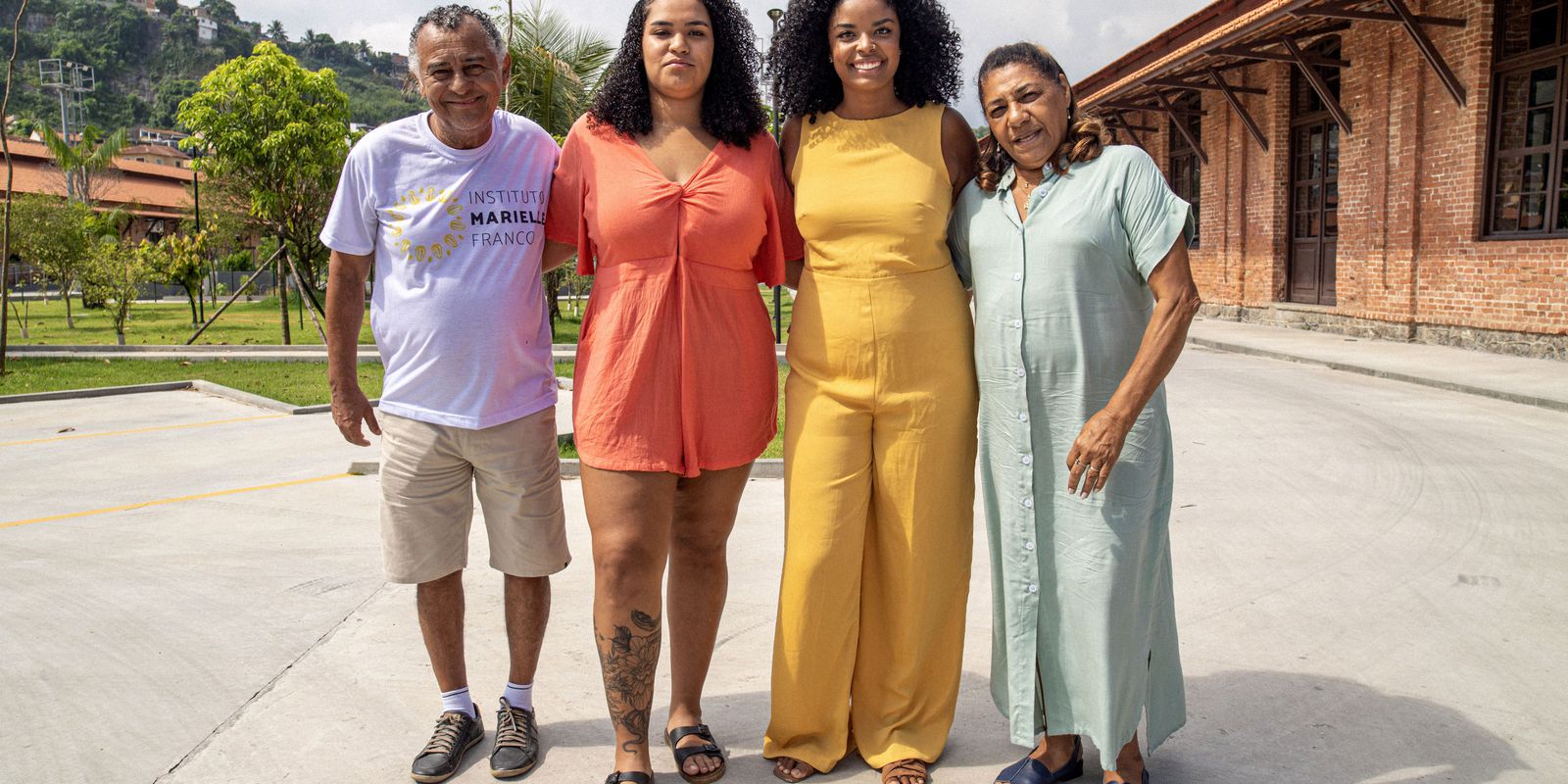Since February of this year, the Marielle Institute has a new director. Lawyer Lígia Batista, 29, took office after Anielle Franco, sister of the councilor who was murdered on March 14, 2018, accepted the invitation to lead the Ministry of Racial Equality. Lígia is responsible for directing an institution created in 2018 to preserve Marielle’s legacy and put pressure on the authorities investigating the case. The institution has grown and today proposes to lead projects for the inclusion of black women and people from the favelas in positions of power in the country.
The new director graduated in law from Universidade Federal Fluminense (UFF) in 2016 and is studying for a master’s degree in public policy in human rights at the Federal University of Rio de Janeiro (UFRJ). Academic research focuses on the representation of black women in politics. She worked for almost six years at Amnesty International and four at the Open Society Foundations (an international philanthropy network). Lígia met Marielle Franco when the parliamentarian was a member of the Human Rights Commission of the Legislative Assembly of Rio (Alerj) with Marcelo Freixo, even before she was elected councilor in 2016. She became an inspiration for the lawyer, who now assumes her new responsibility with pride and special affection.
Brazil Agency: How was your professional and intellectual career built up to this point, before arriving at the Marielle Institute? Have you always worked in the area of human rights?
Ligia Batista: I begin to understand myself from law school. I considered the possibility of working in the justice system, in some capacity as a public defender, prosecutor, judge, but I could never feel so comfortable in that kind of place. Especially because the justice system reproduces several things that affect me in several ways, both with regard to what it means to be a black person in there, to be a woman, to be a young person. I didn’t feel comfortable with the idea of being in there. Even though I think it’s super important that we have people committed to transforming the system from the inside. But I chose to walk from civil society and start my journey within Amnesty International. There, in 2013, I joined the organization’s political research team, and my career in human rights was strongly built on that first great experience.
I have already worked with several agendas, such as the right to adequate housing, natural resources, the right to protest, but what influenced my professional career a lot was certainly the agenda of public security and the Criminal Justice system. I acted very strongly with the agenda of confronting police violence, I monitored the victims, the relatives of victims of violence. Incidentally, this is the great point that connects me with Marielle’s trajectory, because it is precisely because of this work on the public security agenda that I began to articulate with Alerj’s Human Rights Commission, which at the time she coordinated. And it is there that we minimally create a flow of power – forwarding, through Amnesty, these family members to be welcomed by the Legislative Assembly, so that this commission would help forward the families to psychosocial care, to be accompanied in the meetings of the Ministry Public, in police stations. This connection arises from there and, after Mari’s murder, my connection with the family still takes place within Amnesty, due to the campaign for justice for Marielle and Anderson, which Amnesty International built at that time, right after the murder. . Amnesty’s position at that time was very important, because the institute had not yet been founded, the organizations were still understanding how to react to what had happened and Amnesty International mobilized and built a strategy that involved campaigns to raise awareness of society for this case. . From then on, I met Dona Marinete, Seu Antônio, Luyara, Anielle, Mônica Benício. This connection takes place during my career consolidation period in the field of human rights research.
Brazil Agency: How were the personal encounters you had with Marielle? Has it become a reference for political action?
Ligia Batista: Yes. Both on a professional and personal level, Marielle was a place of inspiration for me. Including, at a very delicate moment in my life when I suffered harassment on public transport. It was a pretty traumatic moment. Marielle, already elected as a councillor, welcomed me, she thought with me about the possible ways forward. Understanding that her mandate demanded this place of collective mobilization. It was a place of care, of politics of affection. So, for me, Marielle is important not only from a professional point of view, but also from a personal point of view.
She always served as a great inspiration, because she was very present in the day to day struggles, so everyone met her at social movement meetings, public hearings, everywhere. From the moment she works on the Human Rights Commission, and after that when she takes over as councilwoman, her presence seemed even greater in spaces. She was an active person, she moved around the city and the state of Rio a lot. And being able to meet her, hug her, be able to celebrate the victory in the election, was always a reason for great joy for me and for other people. Although it is very sad to have to mark this half decade without answers, it is also a source of great pride to be able to continue to continue the work at the Marielle Franco Institute at this time. Even more so with this possibility of succeeding a minister. It’s a big responsibility, but it’s still a source of great pride.
Brazil Agency: What was it like to receive this invitation to lead the institute and defend Marielle’s legacy?
Ligia Batista: I think the nomination comes for many reasons. The first of these is related to the fact that I had the possibility of having crossed paths with Marielle at some point and getting to know her trajectory. But, above all, having a very trusting relationship with the family. Since from the beginning, since my work at Amnesty International, this relationship was being established. Until later, when I start building part of my professional career within international philanthropy. It’s where I mobilized networks that worked to confront racism in Latin America. I continued to be a great supporter of the institute and have followed it since its creation, since the beginning of this process. So, the fact that I had experience in civil society, that I had a good relationship with my family, with partners at the Marielle Franco Institute, was important.
And the invitation came at this moment of the great transitional challenges, in which we not only have to respond to the demands of the 14th of March, the case and the other things we do here, but also structure this organization. Because we want the institute to survive forever, regardless of our existence here. So, I also come to add in that sense, to help give more and more muscle to the Marielle Franco Institute today and to what it intends to be in the future.
Brazil Agency: The institute arises from an initiative by the councilwoman’s family, to defend her memory. Does your taking over as director in place of Anielle also represent a change in the sense of expanding projects and actions beyond the family history? Focus more on policies to combat racism, femicide and inclusion policies for black women?
Ligia Batista: Yes, I’m here to continue, because even though I’m not part of the family, I’m someone who knows the case, who has a good relationship with them and with the partner organizations. And I intend to follow up on important projects that we have built internally. One of them, for example, is the Marielle Franco Agenda, which serves as this great charter of principles, as a political tool that seeks to guarantee the commitment of progressive parliamentarians in Brazil with the guidelines and practices that Marielle had when she was in office.
We are very sought after, within this tribute agenda, to help guide people in terms of how to build pieces, books, in short, a dozen things that refer to the rescue of Marielle’s memory for Brazilian society. We have a dream, in the future, of creating a center for the memory and ancestry of Marielle Franco, which will have a collection of her history. We are already in the cataloging process. We have several open paths to explore there, but we usually write our work in four main lines. First, the axis of Justice for the case. Second, keep Marielle’s memory alive. Third, legacy multiplication. And, finally, being able to water these seeds, both in the sense of continuing to inspire other women to enter politics, but also to mobilize new generations to be together, activists who are committed to our causes. The seed network is an initiative that we have been trying to consolidate over the last few years, which is basically a network for mobilizing people all over Brazil in favor of the actions that the Institute has developed. So, these have been the main lines of action at the moment.
Brazil Agency: What are the prospects for dialogue between the institute, society and public power at this time of political transition, taking into account the reinforcement of Anielle in the Ministry of Racial Equality and the loss of protagonism of political groups that fed hate speeches and were against to the guidelines that the institute defends.
Ligia Batista: This new political moment is the resumption of a democratic project. We were seeing, by leaps and bounds, the advancement of Bolsonarism in Brazil, which did not cease to exist. We realize that conservatism and the extreme right continue to grow. It is essential, in the context of resuming a democratic project of power, that civil society is strong and engaged in promoting an agenda of rights. It is important, at this moment of March 14th, that we are able to recognize the importance of responding to these murders, because I believe that providing a response dialogues with what Brazilian democracy is. We are in a country that is extremely violent, which historically has always killed many human rights defenders in the most diverse positions.
The lack of answers about the murder of Marielle and Anderson only fuels the continuity of this cycle. And it generates a climate of fear and insecurity so that other black women can occupy spaces of power and decision-making. So, it is fundamental that the Brazilian State is able to solve this crime. May we not allow whoever ordered the killing to go unpunished and may continue to perpetrate this same violence against other companions and activists, against other black and trans women committed to the human rights agenda. It seems fundamental that we recognize this moment as a victory for democratic recovery, but also that we remain very alert, because conservatism and the extreme right continue to grow.

















